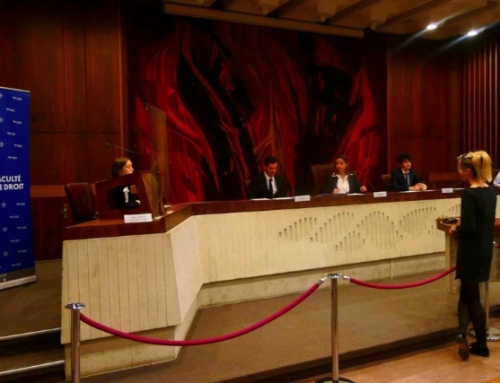In a report presented in February 2022 to the Ministry of Higher Education, Research and Innovation and entitled: “Raising awareness and training for the challenges of the ecological transition and sustainable development in higher education”, a few main objectives were highlighted :
- Upgrade all higher education courses
- Accelerate and strengthen the involvement of higher education establishments
- Mobilize higher education staff
- Mobilize learners
As far as learners are concerned, the movement is well underway.
But since 2019, following a remarkable intervention by graduates of the École Polytechnique, many students have taken the floor, grouping together to invite their fellow students to move the lines quickly. We’re not yet talking about a total revolution of the system, as astrophysicist Aurélien Barreau would have us believe, when he challenged participants at MEDEF’s 2022 summer university by declaring “we’re not the solution, we’re the problem”. However, asking the question in these terms: “How is it that a school as generalist as Polytechnique doesn’t include any courses on sustainable development in its core curriculum, when, it bears repeating, it’s the main challenge of our time?” left a lasting impression.
The same students subsequently pledged to work “only in companies that have already initiated these changes or that are ready to question their development model”. In Anne-Gaëlle Goll’s speech at the HEC graduation ceremony for the H20 and H21 classes, we find the same commitment and the same question: “In the coming decades of our professional lives, we have the opportunity to make history, to stop perpetuating a financial and commercial system that consumes far more than the planet’s resources, and that will affect humanity for centuries to come. But how can we follow through on our commitment when the very name HEC is the embodiment of power in the current system?”
The manifesto “For an ecological awakening of public action”, published in June 2022, has been signed by some 33,000 students in France. It is accompanied by 27 proposals addressed to the President of the Republic, the Prime Minister, the Minister for Ecological Transition and the Minister for Transformation and the Civil Service. We can no longer doubt the seriousness of our young people, nor the urgent need to offer them something concrete as soon as possible.

Mobilization is widespread.
This can be seen in the response provided by MESRI, which in essence details the mobilization of the Directorate General for Research and Innovation towards this major change of direction: “The DGRI’s scientific sectors are involved in the preparation, implementation (via higher education and research establishments) and evaluation of national environmental strategies (SNBC, PPE, SNB, Ecophyto and Santé-Environnement national plans, etc.). The DGRI’s main contribution is to mobilize, structure and provide resources for the research teams of organizations, universities and companies working on these issues”.
Even more concretely, the incentives and control measures to ensure compliance with this new line of responsibility translate into clear instructions to be respected by all establishments that call on their supervisory ministry to lead the transformation. For example: “It should also be noted that in PIA4 calls for projects, and in particular those linked to acceleration strategies, a paragraph on the DNSH principle is now systematically included, worded as follows: “Projects causing significant harm to the environment will be excluded (application of the DNSH-Do not Significant Harm principle). Where applicable, projects will have to justify the environmental neutrality of the proposed solution’s applications and/or be part of an improvement process in relation to a reference solution”.
“All aware” seems to be a watchword running through higher education establishments at all levels, and one that should inspire future development strategies. Green campuses, optimization of resources, responsible digitization of teaching resources, training of teaching and administrative staff – everything should be accelerated to contribute to the goal of a Nation.

But what about training courses? Have they all taken on board this awareness of the ecological transition? And which establishments are most committed to this approach?
Many establishments could be cited as examples to show just how widespread the mobilization is.
Here are three that may inspire us:
The University of Paris 8 Vincennes – Saint-Denis, for example, is committed to a policy of social responsibility that goes beyond social responsibility to include and respect the diversity of its students. The university’s project aims to “preserve and build our environment in continuity with the steps already taken as part of the “Sustainable Development and Social Responsibility” mission, the Energy-Water Master Plan, and participation in the Critical Edge Alliance project, prioritizing the improvement of energy management in line with the objectives set out in the ELAN law.”
Another example can be found in Strasbourg, where the project for a responsible Faculty of Letters was launched in 2020, under the impetus of the teaching staff. Numerous initiatives have already been launched, in addition to communication around the two major issues identified: sexual and sexist harassment at university, and sustainable development within the Faculty of Letters. Climate fresco” workshops, nudges to encourage reflection in buildings, a participatory calendar, etc…
We would also like to remind you of the importance of the DDRS label, which some universities have already received, as is the case at Poitiers. Indeed, in 2016, the university was one of the first two French universities to be awarded the DDRS (Sustainable Development and Corporate Social Responsibility) label. This label not only recognizes the already significant results achieved at Poitiers, but also attests to the sincerity of an approach that is part of a continuous improvement process towards an “eco-campus” promoting biodiversity on campus, reduced energy consumption, the development of soft mobility, and a “zero waste” strategy.
In addition, a large number of universities have already included courses focusing on sustainable development in their catalogs, at various levels covering B.U.T, Licence and Masters degrees. Some, such as Sorbonne University, go even further in adapting to tomorrow’s world, offering a health course whose “objective is to train healthcare and administrative professionals in the theoretical bases of the impact of climate change on the health of populations and healthcare establishments”.
It’s easy to see that, while the students came out and paved the way for an in-depth change in the commitments of higher education establishments, the latter reacted strongly and, for the most part, entered a phase of profound change. In addition to the contribution that digital tools can make to more responsible governance, universities and business schools also need to involve all stakeholders (staff, teachers and students) in this change of mentality and attitude. Each and every one of us is responsible, or must quickly become so, echoing the call for an ecological awakening.
In fact, the Jouzel report submitted to the MESRI (the French Ministry of Industry, Research and the Environment) last February sets out a number of avenues for reflection and action that could be useful to all those committed to a responsible future.






